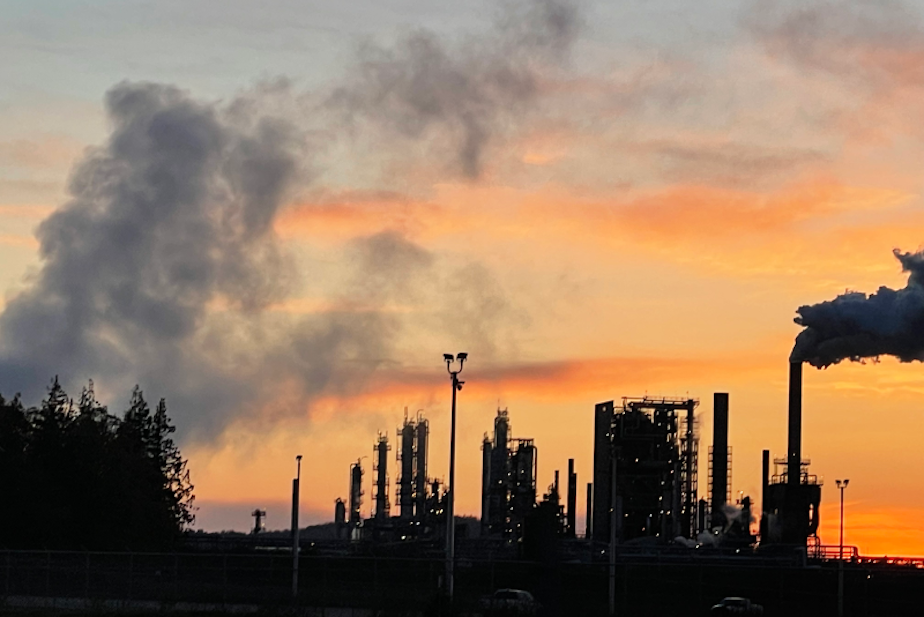Washington carbon auctions resume after surviving election challenge

Washington state held its first carbon auction since voters upheld the state’s flagship climate law in November.
The results of Wednesday’s auction, with hundreds of millions of dollars changing hands, won’t be revealed for another week.
But with the state’s system for capping carbon emissions no longer at risk of being repealed by voters, the price businesses are willing to pay to keep harming the climate is expected to climb.
“We expect to see a significant jump in the [carbon] price with this auction,” Peter Godlewski with the Association of Washington Business said in an email to KUOW.
More-expensive carbon could mean both higher gasoline prices and greater funding for programs to fight pollution and improve public health.
Since February 2023, many major polluters in Washington have had to compete in carbon auctions, where they bid for allowances to keep adding heat-trapping carbon dioxide to the atmosphere.
In just under two years, polluting businesses have paid nearly $3 billion, supporting a surge in state spending on everything from electric school buses to salmon habitat.
Other major emitters, including oil refineries, pulp mills, and steel mills, get to keep polluting for free to keep the businesses from leaving Washington.
Critics say the quarterly carbon auctions have driven up the price of gasoline, though the amount is hotly debated.
“There's multiple things going on with gas prices, which is why it's a little hard to tease out how much is potentially from this policy versus how much is from supply and demand fundamentals in the market,” Western Washington University economist Zoë Plakias said.
RELATED: Climate pollution surges in Washington state after pandemic lull
Plakias said businesses’ payments for their carbon emissions have not come close to covering the damage that their pollution causes.
“Emissions are incredibly costly for us as a state, right? They are costing us, and so the goal of this policy is then to reduce that social cost,” Plakias said.
The U.S. Environmental Protection Agency has estimated what’s known as the social cost of carbon — the sum of damages from carbon emissions' disruption of the global climate — to be about $190 per ton of carbon dioxide emitted. To date, Washington carbon allowance prices, while fluctuating, have averaged $44 per ton, or about one-fourth the damage caused by those emissions.
RELATED: Washington carbon exchange lets many big polluters off the hook
In November, Washington voters rejected, by a 62% to 38% landslide, Initiative 2117, which would have eliminated the state’s cap on carbon emissions.
Before and after the election, the Association of Washington Business has called for increasing the number of carbon allowances — in other words, allowing more pollution — to reduce costs to Washington businesses and consumers.
State officials say 61% of auction proceeds to date have benefitted vulnerable populations in communities hard-hit by pollution, far surpassing the 35% minimum requirement.
The incoming Trump administration has pledged to stop such “environmental justice” work by federal agencies.
Federal rollbacks could leave state funding from carbon auctions playing a bigger role for communities burdened by pollution.
“I do think it will insulate Washington state to some extent,” Plakias said.
“The role of state climate action is about to become more important than ever given what’s going to happen at the federal level,” Mike Faulk, spokesperson for Washington Gov. Jay Inslee, said in an email to KUOW. “We plan to use every resource we can – including [auction] revenue – to support our transition away from fossil fuels and deliver communities cleaner air and water, as well as access to affordable clean energy.”
Project 2025, a conservative blueprint written for the incoming Trump administration and co-authored by several administration nominees, calls for eliminating a range of federal programs including the Environmental Protection Agency’s Office of Environmental Justice and External Civil Rights.
The New York Times reports that the Trump transition team plans to eliminate every office in every federal agency working to combat pollution that harms vulnerable “environmental justice” communities.




